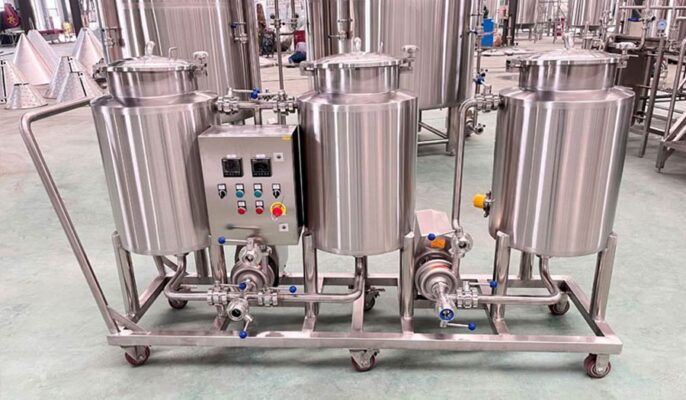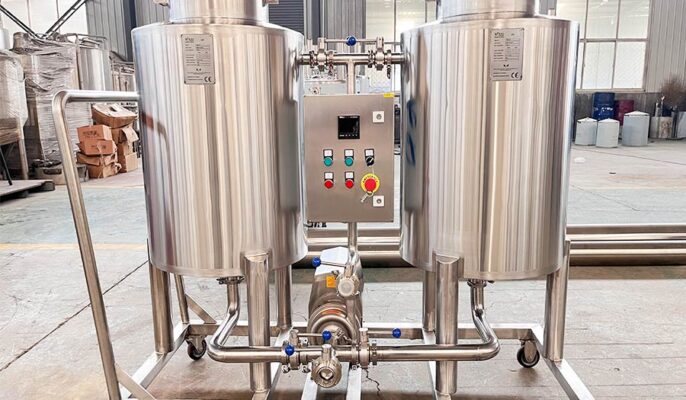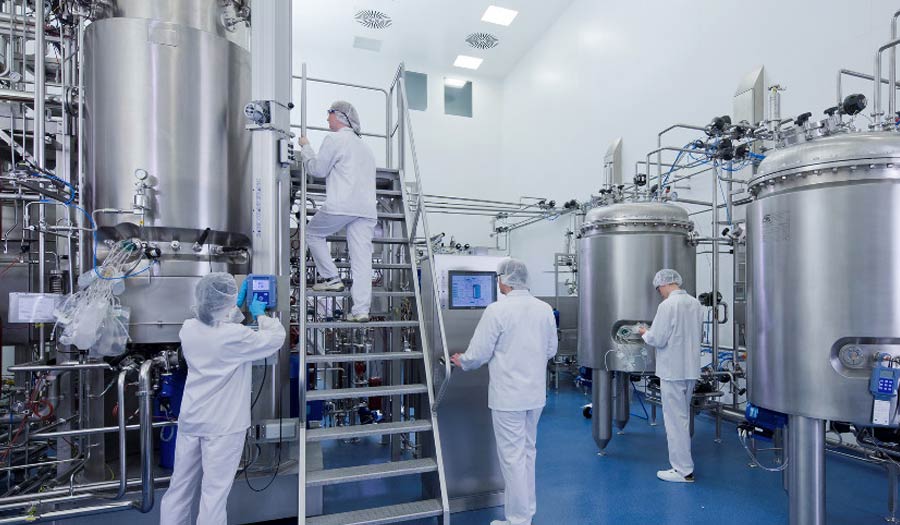CIP systems (Clean in Place) are revolutionizing the way equipment in the food and beverage industry. To produce high-quality, safe, and reliable beer, a clean and hygienic environment must throughout the brewing process. For breweries, CIP systems are to clean product contact surfaces , and with high quality. CIP systems enable speed and consistency through automated processes and high-quality cleaning through system monitoring.
Qu'est-ce qu'un système CIP ?
CIP in a brewery is a cleaning process used to clean the interior surfaces of tanks, pipes, and other equipment used in beer production without disassembling the equipment. The process involves circulating a cleaning solution through the equipment, followed by rinsing and disinfecting to ensure all surfaces are free of contaminants, residue, and bacteria. The design of these systems may vary based on the intended application, industry, and factory standards. They can be portable or stationary, and can even have many tanks. While they may differ in many ways, they are always constructed the same and have similar functional parts. Modern CIP systems can and programmed to operate according to specific cleaning protocols, reducing the risk of human error and ensuring consistent results.

How does the CIP system work?
- Preparation: Before starting the CIP process, the equipment must be prepared by closing all valves, draining any remaining product, and securing all hoses and connections. This step is critical to ensure that the cleaning solution can circulate freely through the components without leaking.
- Cleaning solution cycle: The detergent cleaning phase involves using a cleaning solution to remove any remaining dirt and debris. The cleaning solution is automatically pumped into the equipment and soaked for a designated period to ensure all surfaces are thoroughly cleaned.
- Drain and rinse: Next, it’s time to drain the device and rinse it with water to remove the cleaning solution. This step is critical to ensuring that no hazardous materials, cleaning agents, or other contaminants are present on brewery machinery.
- Disinfection: accomplished by circulating a special disinfectant solution (such as sodium hypochlorite or hydrogen peroxide) through the equipment. It helps kill any remaining bacteria or other harmful microorganisms that may affect the quality of the final product.
- Final rinse and drain: After rinsing the disinfectant, the equipment needs to be drained again to remove any residual disinfectant from the equipment. As you can see, the entire CIP process doesn’t have to be complicated or time-consuming.
A CIP cycle in a brewing facility can take 60 to 90 minutes. The entire process is automated, and workers don’t have to worry about mixing chemicals or starting the next stage of the cycle.
CIP equipment system type
Système à réservoir unique
- Generally preferred to avoid allergen and cross-contamination issues as each cycle is dumped into the sewer after a single pass.
- Les systèmes à réservoir unique nécessitent un investissement initial moins important que les systèmes à réservoirs multiples.
- Requires less space and can be installed on a cart for easy movement.
Système à deux réservoirs
- Often, the caustic wash solution can be returned to the tank and reused many times, which reduces water, chemical, and energy costs over a single tank system.
- Cleaning time can be shortened by pre-filling and preheating each water tank as needed before starting a cleaning cycle.
- Can be installed on a cart for easy movement.
Système à trois réservoirs
- Reduce cleaning time
- Depending on the amount of soil in the treatment system, the alkaline washing liquid and acid washing liquid can be returned and reused.
- Water/Alkali/Reuse: If acid cleaning is not required, a reusable tank can collect contaminated alkaline wash liquor and use it as an effective pre-rinse for the next cleaning sequence.
- For cleaning many circuits with different types of product soil and requiring different types or concentrations of caustic cleaning.
Why are CIP systems important for breweries?
Time and efficiency improvements
The increased efficiency that a CIP system brings to brewery operations is one of its key benefits. Manual cleaning procedures take a long time and are labor intensive. CIP systems cut this necessity and allow breweries to focus on other important responsibilities. Increased productivity, reduced downtime and faster turnaround between batches are all benefits of this time-saving feature.
Thorough cleaning
The CIP system ensures thorough, consistent cleaning throughout the brewery. The system uses designated cleaning cycles and meticulous procedures to effectively remove contaminants and residues. The quality and flavor of the beer are maintained through this consistency, which reduces the possibility of human error and ensures every piece of equipment is cleaned to the same high standards.
Reduce chemical and water use
Another advantage of a CIP system is its effectiveness on water and chemical usage. CIP systems reduce water consumption and the need for cleaning agents by simplifying cleaning procedures. To further improve sustainability and efficiency, these systems often use cutting-edge technology such as flow meters and sensors to watch and regulate water and chemical usage.
Reduce contamination risk
If there is the possibility of contamination during the brewing process, the brewery can suffer serious consequences. CIP systems are critical to reducing this risk by ensuring adequate cleaning and disinfection. The CIP system eliminates organic matter, bacteria, and yeast, creating a clean environment that prevents the formation of harmful bacteria. This extends the life of your brewing equipment while protecting the integrity of your beer.

How to choose the best CIP system for you?
- Consider needs: Every brewery has different needs, so it’s critical to choose a CIP system that can be customized to meet specific needs. Consider factors such as the size of the brewery, the type of equipment, and the challenges faced during the cleaning process. For brewery layout and equipment customization services, please contact Groupe Micet. Our professional team helps you complete your brewery needs.
- Equipment Selection: To get the best cleaning results from a CIP system, it is crucial to select the appropriate equipment. Consider construction materials, their compatibility with cleaning solutions, and ease of maintenance. Breweries often use stainless steel equipment because it is durable and resistant to corrosion. Make sure the system has the required parts, such as pumps, control panels and spray balls, to meet your cleaning requirements.
- Integration with existing infrastructure: Compatibility and connectivity with current infrastructure are important factors to consider when selecting a CIP system. Ensure the system operates in harmony with the brewery’s automation and control systems. Operational efficiency, data exchange, and improved monitoring capabilities will all be enhanced through compatibility.




